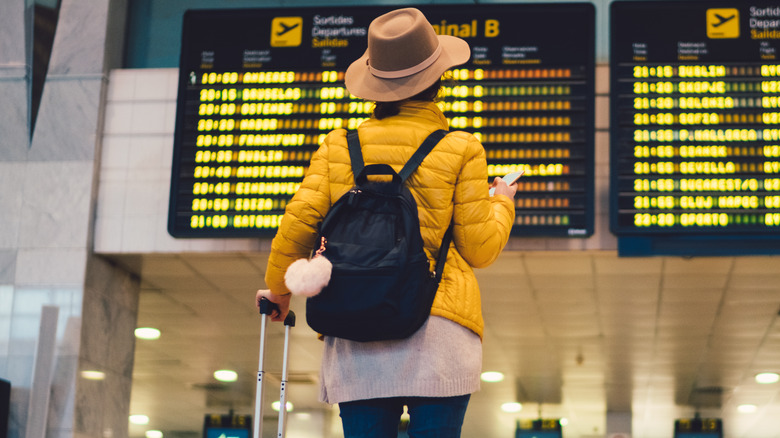How To Get A Refund From A Booking Site If Your Flight Is Canceled
Once upon a time, calling your travel agent would have likely been a go-to move anytime you needed to fly. While travel agents are certainly still helpful in many adventuring situations these days, more than ever, travelers can simply select their preferred booking site and organize their getaway independently. At the touch of a button, you can confirm your flight and begin looking forward to the trip to come.
The appeal of booking sites often comes down to their convenience factor. They're purposefully designed to be quick, simple, and easy to use. What is less convenient is knowing exactly where to turn when that flight you booked happens to be canceled.
Choosing not to book a flight directly through an airline is perfectly fine. However, it's important to realize that when you use a booking site and your flight is canceled, there's a good chance getting a refund is going to take more time. Being aware of the steps to take to get your money back is important to know ahead of time.
If the flight you booked through a booking site such as Priceline or Expedia never takes off, the very first thing to do is reach out to a site representative. This is a number to keep handy from the moment you make your reservation. A site representative will be able to let you know if the airline will be automatically issuing a refund, or if you'll have to take additional steps to get the refund process started.
It's a waiting game
The U.S. Department of Transportation does entitle consumers to a refund for canceled flights. Still, you can confidently assume that getting a refund through your booking site requires a good amount of patience. For all of the conveniences these sites offer initially, they're also required to follow cancellation rules put in place by partner airlines when things don't go according to plan.
That means there's simply not much wiggle room for booking sites when it comes to negotiating a faster refund, or a refund at all if the airline hasn't yet authorized it. These limitations can be frustrating and inevitably lead to some serious delays for passengers waiting to get their money back. To help move things along, many booking sites have refund request forms available online. This helps passengers get the process moving and perhaps get out ahead of the refund bottleneck that could potentially be on the horizon.
The best case scenario for getting a refund for your canceled flight through your booking site happens when the airline confirms immediately that the flight has been canceled and a refund will be processed for passengers. In this case, it's still important to reach out to your booking site and confirm the situation, but there won't be much you have to do except wait from that point on. Your site representative can be your go-between with the airline if there's any delay with the refund.
Other steps you can take
When it comes to travel, there's always the chance that things simply won't go according to plan. Flights get canceled for all kinds of reasons and having options in place for a variety of scenarios before you head to the airport can help ease the stress. If your flight has been canceled and you haven't had any luck getting through to a booking site representative, the next step is to try a digital inquiry.
Reaching out by email to get your refund questions answered, or the process started, is the next best thing to speaking directly with a representative. Do keep in mind that this approach could also go unanswered in the wake of a multitude of similar requests being sent at the same time. When all else fails, there's one last step you can take to attempt to secure your refund.
As a very last resort, passengers can consider initiating a hold on the card they used to book the flight. This step is quite involved and requires explaining the situation to either a credit card representative or someone at your bank. The goal is to have the charge reversed citing all of your failed attempts to obtain a refund through the primary channels. Expect to be asked to show all proofs of purchase and a variety of other identifying documentation along the road to receiving your money back.


